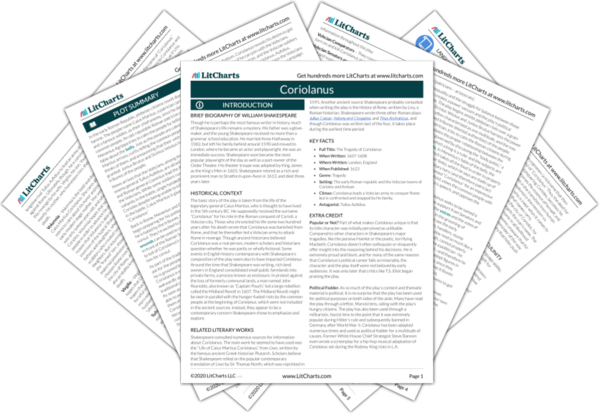Politics, Class, and Rome
Coriolanus is a difficult, masterful, historically unpopular play. The easiest way into this confusing play is politics, and for this reason journalists often cite the “Coriolanus effect” to describe the difficulties of a military figure turned politician. And indeed, in many ways Coriolanus is eerily modern, and it reads almost like a 21st-century political tragedy. At the same time, the play is just as much about ancient Roman politics as it is proto-modern. Shakespeare…
read analysis of Politics, Class, and RomeLanguage and Names
As much as Coriolanus is a play about politics, it is also (overtly) a play about language. Put most simply, the play’s thesis about language could be summed up as “language is power.” It seems insufficient to say that language is important to politics within the play—language is politics. Throughout the play, the plebeians are called “voices,” referring both to their opinions and “voices” meaning votes. It’s these voices (votes) that Coriolanus must…
read analysis of Language and NamesWar, Violence, and Masculinity
What Coriolanus lacks in voice and language ability, he makes up for in military might and a gift for violence. In Cominius’s masterful oration mentioned in the Language theme, we learn that as a sixteen-year-old boy, young, beardless Caius Martius fought against the bearded men supporting a dictator. When he might have “act[ed] the woman,” he became a man. Since then, he has fought in seventeen battles, until he became a “thing of blood”…
read analysis of War, Violence, and Masculinity
Family and Femininity
While Coriolanus is the epitome of violent masculinity, and he has strong homosocial bonds with both allied and enemy soldiers, the play also explores his ties to his family, which is mostly comprised of female figures. Many Shakespeare plays feature characters whose mothers are conspicuously absent, a sort of missing mother trope. Coriolanus, on the other hand, has no mention of a father, but he has the mother of all mothers, Volumnia, and he…
read analysis of Family and FemininityHeroism vs. Humanity
Coriolanus also explores the questions of what makes someone a hero, and whether or not one can be both a hero and a real human. Coriolanus is a man of immense pride, and he is fatally attached to his Roman values. He is uncompromising in his values, and he believes politics and acting are lying and dishonest, so he refuses to take part in them. In this way, Coriolanus is similar to Julius Caesar, who…
read analysis of Heroism vs. Humanity






